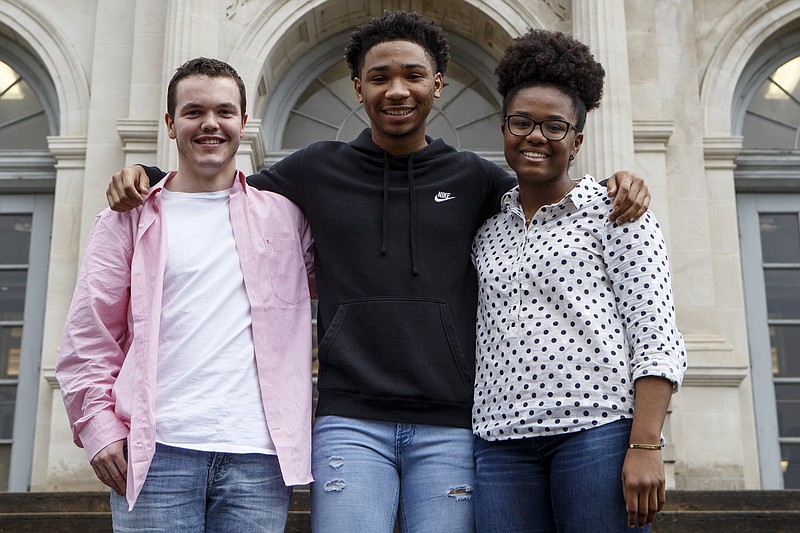 Fisher Latham, left, Brevin Sims and Lauren Tolbert pose at Chattanooga School for Arts and Sciences on Friday, March 1, 2019 in Chattanooga, Tenn. The CSAS students participated in the Tennessee Bar Association's CATALYST program through their gifted program. With the help of gifted teacher, Kelly Davis, the group co-authored the bill which addresses voter registration and proposes a program/partnership through the DMV that would make it easier for eligible Tennesseans to register to vote.
Fisher Latham, left, Brevin Sims and Lauren Tolbert pose at Chattanooga School for Arts and Sciences on Friday, March 1, 2019 in Chattanooga, Tenn. The CSAS students participated in the Tennessee Bar Association's CATALYST program through their gifted program. With the help of gifted teacher, Kelly Davis, the group co-authored the bill which addresses voter registration and proposes a program/partnership through the DMV that would make it easier for eligible Tennesseans to register to vote. Most teens approaching their 16th birthday are focused on getting their driver's license, but a couple of years later, many are not as attentive to registering to vote.
Three gifted students from Chattanooga School for the Arts and Sciences noticed that trend and decided to do something about it earlier this year by drafting a bill that states anyone with a driver's license would be automatically registered to vote at age 18. Similar automatic voter registration or "motor voter" laws are already in place in 16 other states and the District of Columbia, so the students pitched their idea to Tennessee lawmakers this spring.
While they got a polite reception during a legislative hearing in April, the legislation the three were proposing failed to move out of committee and, instead, the General Assembly adopted another voter registration law that criminalizes activities that try to register too many ineligible voters or don't complete state training for the proper registration process.
That new law, which goes into effect Oct. 1, is being challenged in federal court by civil rights groups claiming it will discourage registering more voters.
While the legal challenge to the new, more restrictive registration law proceeds, backers of automatic voter registration are planning to launch a petition drive across the state this week to collect at least 50,000 signatures to try to convince the Legislature to rethink its approach when it reconvenes in January.
"It's definitely harder to register to vote in Tennessee than in some states and unfortunately too many young people don't think about it or take action to make sure they are registered in time to vote in an election," said Fisher Latham, a recent CSAS graduate who did his senior project on legislation that would boost voter participation among young people. "Tennessee has not developed into the modern era and now they seem to be going backwards with the criminalization of those who try to register new voters but might make some mistake or not follow all of the right requirements."
Tennessee Secretary of State Tre Hargett, who oversees elections in the state, insists that "voter registration is easy and quick" and that state rules help protect the integrity of the registration and voting process.
"You can register online and even on your phone," Hargett said of Tennessee's voter registration process. "In fact, by the time someone reads this article, they could have already completed their registration online at GoVoteTn.com."
Hargett also said Tennessee doesn't want to have the same problems California has faced with automatic voter registration, where a state audit found nearly 84,000 duplicate records and twice that number of political party mistakes in the first five months of the program.
Hargett and backers of the new law to better control those conducting voter registration drives insist the change is needed to ensure the integrity of voter registration process and to make sure that state and local governments don't have to incur major expenses checking on improper voter registration drives.
The new law calls for class A misdemeanors if, knowingly or intentionally, groups that register 100 or more people pay workers based on voter-registration quotas, don't complete state training, or fail to ship completed voter registration forms within 10 days of registration drives or by the voter registration deadline.
The state could also fine groups that submit 100 or more deficient voter registration forms under the bill. Those that submit more than 500 deficient forms could face penalties up to $10,000 in each county where a violation occurred.
State Elections Coordinator Mark Goins said about 10,000 Shelby County registrations in 2016 came in from the Tennessee Black Voter Project on deadline and many were filled out incorrectly. Goins said many of the registrations included incorrect, incomplete or duplicate information, ineligible felons, deceased people and other problems.
Hargett estimates the Shelby County problems caused by the forms cost more than $200,000, while similar issues in Nashville's Davidson County cost about $35,000.
But the Lawyers' Committee for Civil Rights Under Law is suing the state over the new law, claiming it will "violate the due process clause of the Fourteenth Amendment and have a chilling effect on the exercise of fundamental First Amendment rights." The group called the law "one of the most restrictive voter suppression measures that we have seen this year."
Pew's Election Performance Index last year already ranked Tennessee 49th in the nation for voter turnout in 2016 and 45th in voter registration.
But Hargett said the lack of participation in Tennessee elections may be more about the lack of competitive races than about any barriers to voters going to the polls.
"There's not an easy out," said Middle Tennessee State University Professor Kent Syler, who has studied the state's voting patterns. "I think it's more lack of competitive races than obstacles to voting."
Brevin Sims, who joined with fellow CSAS students Fisher Latham and Lauren Tolbert to write their proposed automatic voter registration bill, insists motor voter registration would ensure more people are registered and heard at the ballot box. The students developed their proposal and wrote the bill as part of the Tennessee Bar Association's first annual Catalyst Program, which worked with high schools across the state to have students draft bills for sponsorship in the state legislature.
Their bill, Senate Bill 837, was sponsored by state Sen. Raumesh Akbari, D-Memphis, and the companion House Bill 1002 was sponsored by state Rep. Bill Beck, D-Nashville.
"The senators seemed to think it was cute that we came up to testify, but I don't think they took us seriously," Sims said.
The students' proposal never got out of the Senate committee and was referred for a summertime study.
Kelley Elliott, an organizer in Chattanooga for the Tennessee Voter Revivalist Alliance, said she hopes to do better next year and is working on a statewide petition drive to help convince lawmakers to adopt motor voter laws. The current registration process in Tennessee, she says, "is far too burdensome" and could be both simpler and more secure with the new law.
"Why are we not passing pro-Democracy measures in Tennessee like other states?" she asked. "All the same reasons given to enact this new law would be solved by the automatic voter registration and it also opens access."
Elliott said the CSAS students, who were not all even old enough to vote themselves when they wrote their bill, showed the wisdom of what she claims is a simpler, more commonsense approach to voter registration for the state.
"They are trying to lead us, but the adults in the Legislature don't seem to want to listen," she said.
Contact Dave Flessner at dflessner@timesfreepress.com or at 423-757-6340.
